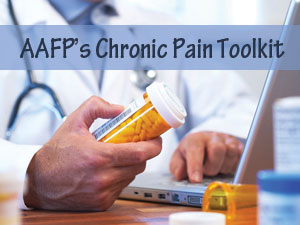 A new, free resource is available for American Academy of Family Physicians (AAFP) members who care for patients with chronic pain.
A new, free resource is available for American Academy of Family Physicians (AAFP) members who care for patients with chronic pain.
The AAFP Chronic Pain Toolkit, developed by the Academy with partial funding from a Substance Abuse and Mental Health Services Administration grant and published online in February, provides family physicians with an assortment of items to aid in the effective assessment, diagnosis, and management of chronic pain.
“Addressing pain is complicated. There are a lot of gray areas in treating pain, and a one-size-fits-all approach does not work,” said Lynn Fisher, MD, an assistant professor in the Department of Family and Community Medicine at the University of Kansas School of Medicine in Wichita,KS, and director of the rural preceptorship. “This toolkit provides us with a variety of tools that we can use to help us manage chronic pain patients and to help us follow the best available evidence at this time.”
Although the exact number of people who experience chronic pain is unknown, a 2018 study published in the Centers for Disease Control and Prevention’s (CDC) Morbidity and Mortality Weekly Report estimated that in 2016, just over 20% of all U.S. adults had chronic pain. Effective chronic pain management may be challenging, and evidence-based tools and resources such as the toolkit may help family physicianss and other primary care clinicians approach pain management in a multidimensional, patient-centered and goal-oriented manner.
- Pain Assessmentgives an overview of appropriate strategies and diagnostic tools used to support chronic pain assessment in patients.
- Functional and Other Assessmentsdiscusses supporting tools and methods for the diagnostic assessment of functional activity and other coexisting conditions, including the patient’s emotional and mental health, quality of life, and other psychosocial factors.
- Pain Managementprovides details on strategies and considerations for effective management of acute and chronic pain.
- Opioid Prescribingcovers the prescribing of opioids as it relates to the treatment of chronic pain and includes information and resources on safe prescribing practices, risk mitigation and monitoring, opioid conversion and tapering tools, and specific resources for patients.
- Opioid Use Disorders: Prevention, Detection and Recoveryoffers a brief overview along with resources in support of opioid use disorder prevention, recognition and assessment, and treatment and recovery.
The Chronic Pain Toolkit is the latest of several Academy resources available on this and related topics.
In February, the AAFP published an opioid use disorder treatment manual to give family physicians additional guidance in treating the condition. The American Family Physician, the Academy’s peer-reviewed clinical journal, has a robust collection of articles on chronic pain, and additional pain management resources are available on the AAFP website and the Academy’s patient-centered website, Familydoctor.org.




